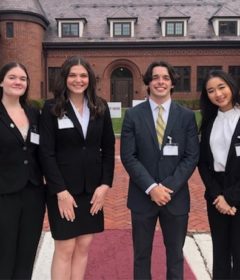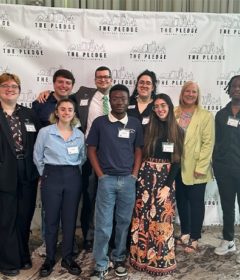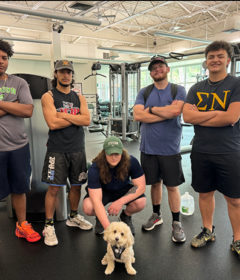Bishkek and Beyond
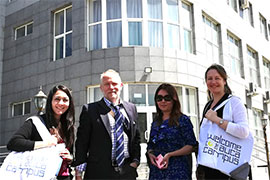
Editor’s note: This article appears in the Spring issue of Stetson University Magazine, now available online.
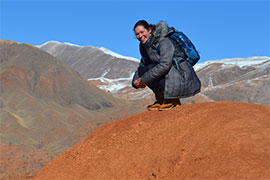
Rebecca Shaffer graduated from Stetson in 2018 with a degree in Russian, Eastern European and Eurasian Studies. A rewarding college experience, assuredly. Yet not your typical course of study.
Then there was spring 2018. A student-exchange program, one that few other universities offer, gave her a semester of a lifetime — at the American University of Central Asia in Bishkek, Kyrgyzstan.
“I took a course on Central Asian politics [with Professor Gene Huskey, Ph.D.] and found out about the Bishkek student-exchange program in 2017,” Shaffer said. “I needed a senior research project, and I wanted to take advantage of my last semester. But nobody from Stetson had gone to Bishkek [on the program] yet, and I was a little nervous about it because I had never been anywhere like Kyrgyzstan before. But I decided to go for it.”
Little-known Kyrgyzstan (Kyrgyz Republic) is a landlocked country with mountainous terrain bordered by Kazakhstan to the north, Uzbekistan to the west and southwest, Tajikistan to the southwest, and China to the east. Its recorded history spans more than 2,000 years, encompassing a variety of cultures and empires. Kyrgyzstan has been at the crossroads of several great civilizations, as part of the Silk Road and other commercial and cultural routes. It attained sovereignty as a nation-state after the breakup of the Soviet Union in 1991. Often referred to as one of the world’s “coolest unknown cities,” Bishkek is the capital and largest city of Kyrgyzstan.
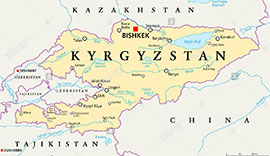
Upon arrival on the other side of the world, initial trepidation turned into education triumph.
“When I got there, I was really nervous,” Shaffer continued. “It just seemed so remote. But once I saw the mountains, which are breathtaking and really close to the city, and realized how nice the people were, I knew I was in for a wonderful adventure.”
Shaffer, who rented a bedroom from a local Kyrgyz family, was able to immerse herself in the culture, especially because, outside of the classroom, she had to speak Russian and Kyrgyz (a Turkic language that uses the Cyrillic alphabet). As part of the exchange program, she attended the American University of Central Asia (AUCA) in Bishkek, working on her Russian language skills, taking classes in its program in Central Asian studies and pursuing her senior research project, which entailed comparing the use of social media in the 2014 Ukrainian revolution and the 2010 Kyrgyzstan revolution.
“I looked at movement-building, the ‘movement as the leader’ concept and effective communication strategies in this kind of environment,” Shaffer explained. “I took a comparative politics approach on how social media affected each of these revolutions.”

MUTUAL ADMIRATION
A few years ago, Michael Denner, Ph.D., professor of Russian Studies at Stetson and director of the University Honors Program, began talking about the possibility of an exchange program with his former adviser in graduate school, Andrew Wachtel, Ph.D., who just so happened to be the president of AUCA at the time. Typically, AUCA has partnered with Bard College in New York, but Stetson steadily has forged a relationship with AUCA by virtue of its School of Business Administration; many of AUCA’s students are business majors. A reciprocal agreement now has been in place for two years.
“Two Bishkek students came here in the fall, and two others were here last year, but Rebecca was the first Stetson student to go there,” Denner said. “We have a lot of opportunities for study abroad, and Bishkek isn’t a place people are usually familiar with, but more and more students are finding out about it, and we expect more of them to take advantage of the program in the coming years.”
According to Paula Hentz, director of international learning at WORLD: The David and Leighan Rinker Center for International Learning at Stetson, the exchange program represents budding mutual admiration.
“We want to ensure every student is having an international experience in one way or another,” Hentz said. “We have a strong Russian, Eastern European and Eurasian Studies program here and wanted to start a proper student-exchange program in that part of the world. Also, it’s great to have foreign students come to us because it helps internationalize our campus. The Bishkek students have really fun, great attitudes when they come here. They’re outgoing and friendly, and our students are learning about their culture.”
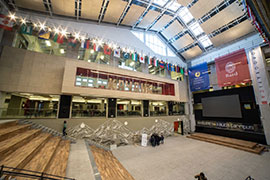
Denner and Hentz spent last summer in Bishkek, along with Mayhill Fowler, Ph.D., assistant professor of history and director of Stetson’s Program in Russian, East European and Eurasian Studies (known on campus as SPREES). There were four days of meeting with AUCA faculty, administrators and students. AUCA is known as the best institution of higher learning in Central Asia, with a diverse faculty and students, complemented by top-notch facilities and a faculty well-respected for research.
“We didn’t know what to expect, and we were blown away,” Denner commented. “Plus, the city is beautiful with these majestic mountains towering in the background, communities are really nice, and people are friendly and happy-go-lucky. Few Westerners go there, so they totally embraced us.”
Fowler, a veteran traveler to these parts, points to Bishkek’s globally important location, near both China and Russia. “This was part of the Silk Road, the crossroads of empires,” Fowler said. “They have a non-Western-centered understanding of the world, and for Stetson students, it’s about getting out of their comfort zone and becoming global citizens.”
‘THESE INCREDIBLE PLACES’
While acknowledging the difficulty of study abroad in such an unknown place, Fowler believes the experience can set students apart.
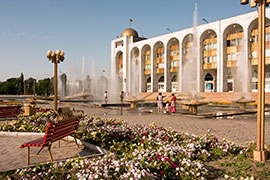
“We want to position Stetson for the future as having student-exchange programs in places not necessarily well-known in study-abroad circles. We have students in Warsaw in Poland, Kyiv in Ukraine, etc., and this entire region is an important part of the world. So, we want to be able to offer different but key places like Bishkek as study-abroad locations,” she said.
“The world is a complex place, and I want Stetson students to learn about and experience this world in all its complexity.”
Denner agrees that for students, it is all about broadening horizons, both figuratively and literally.
“In life, you’re limited by your network, so you broaden this network by studying abroad,” he explained. “You simply meet more people, and it’s because of the people you know that makes life interesting.”
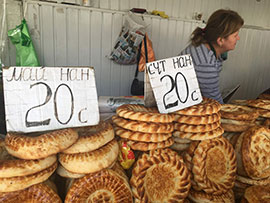
The main goal now is to expand the program.
“Can we attract students to Stetson from these incredible places?” Denner asked, rhetorically. “They need to be daring and intrepid to come here, and the same goes for our students going there. Think about what two students from Bishkek can teach students just by meeting and talking to them.”
“It’s about your ability to see other points of view,” Hentz said. “This creates a better understanding of the world around us, our place in the world and how we can make it better.”
Shaffer, currently living in Pittsburgh and working for the nonprofit PennEnvironment, a citizen-based environmental advocacy organization, is interested in going back to Bishkek to do policy development, specifically as it applies to infrastructure and transportation.
Her first trip there, fittingly, helped to provide a bridge.
“Going to Bishkek was such a rewarding experience for me; it opened me up to another part of the world,” Shaffer concluded. “I met amazing people whom I’m still in contact with and who have changed my perspective on the rest of the world. I’m better for the experience and wouldn’t trade it for anything.”
-Jack Roth
DID YOU KNOW?
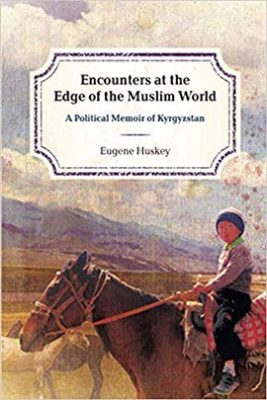
Stetson Professor Eugene Huskey, Ph.D., began visiting Kyrgyzstan right after the collapse of the Soviet Union and now is widely considered an expert on the region, knowing many of the movers and shakers in Kyrgyz politics personally. His new book, “Encounters at the Edge of the Muslim World,” published in September 2018, not only is a political science exploration of democratic transition, but also a thoughtful narrative about what it means to learn a new culture, language and place in a time of change, according to reviews.
The book even includes a personal note of support written by the former Kyrgyzstan President Roza Otunbayeva, whom Huskey knew before she was president, and includes the story of famous Kyrgyz writer Chingiz Aitmatov’s visit to Stetson University in 1991.

